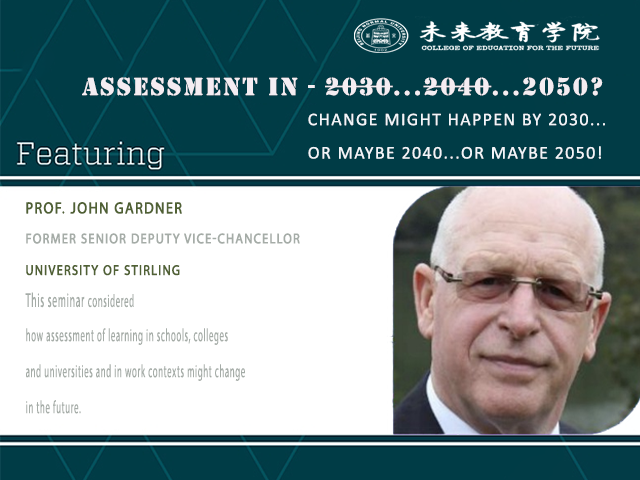On March 29, the 7th International Salon on Future Education hosted by College of Education for the Future was held at A101, Lijiao Building. John Gardner, professor of Education and former Vice President of University of Stirling gave a lecture on the topic of Assessment in - 2030...2040...2050? , discussing the development direction of educational assessment methods in the future and analyzing the core role of artificial intelligence technology in complex educational assessment in the future. Relevant teaching and research personnel and more than 40 students attended the salon.

First of all, Gardner analyzed the public understanding of assessment, the tension between reliability and validity, the conventional principles and purposes of assessments, and the over-arching design feature that everybody must do the same examination. Many conventional tests tell us nothing about a student's various important skills, such as communication, team-working, creativity, problem solving and adaptability to new situations. These skills are vital to successful futures for our young people.
During the lecture, Gardner designed a game to help the audience understand the multidimensional attributes of assessment of learning. The game set two people as a group. Each one designed and made their own paper airplanes, and threw the paper airplanes to the platform together, then the team members scored each other. Through the evaluation of different dimensions of paper airplanes, it stimulated teachers and students to think about the assessment of learning: whether it is necessary to change the conventional one-size-fits-all evaluation method and carry out a more comprehensive assessment of students? Even if the scores are the same, how to quantify the scores of different dimensions behind them?

At the end of his speech, Gardner raised his expectations for the educational assessment in the future. He said, assessments of the future must be able to identify the positive attributes and achievements of students and not just what they cannot do. Such tests will be tailored to each student, capable of identifying excellence whether the person is oriented to mathematics and science or to art and music. Realistically, the only way this will be achieved is by harnessing the power of artificial intelligence to monitor the whole of a student’s learning journey and to identify both reliably and validly their strengths and weaknesses across a wide range of leaning contexts.
In the Q&A session, the professor and students had an in-depth exchange. Huang Sisi, a master's student of Subject Teaching, focused on the impact of the gap between the rich and the poor on educational equity, and put forward the question about how to ensure the fairness of poor students in the national examination. "There is a real concern about educational equity," Gardner said. "Virtually all tests today face the same dilemma: How to design tests for all students?” Huang Jingyuan, a student of Leyu College, said that it was difficult to quantify the core literacy including digital literacy, critical thinking, innovative thinking and so on. He wondered how to use AI technology to comprehensively evaluate them. Gardner said, the first step was to scientifically define indicators of literacy such as innovative thinking, and then use large amounts of data to optimize the AI algorithm to improve the results over time.
John Gardner is a professor of Education at the University of Stirling and is the former Senior Deputy Vice-Chancellor of the university. From 1994-2010, he was a member of the UK's Assessment Reform Group and is a fellow of the Chartered Institute of Educational Assessors. He is a fellow of the Academy of Social Sciences and fellow of the British Computer Society. He has authored or co-authored seven books, the most recent being: Assessment and Learning (2012, Sage), Developing Teacher Assessment (2010, McGraw-Hill/Open University) and The Classroom X-Factor (2011, Routledge).


